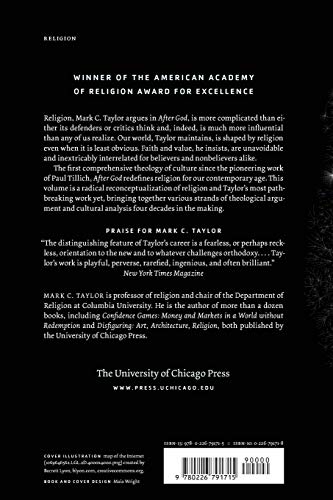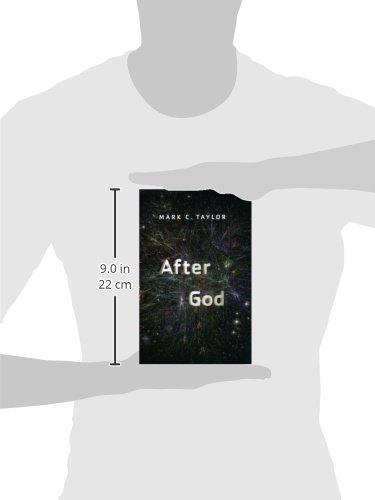Customer Services
Copyright © 2025 Desertcart Holdings Limited




Full description not available
B**B
the "complex adaptive network" and your involvement
Mark Taylor is the head of the religion department at Columbia University. Therefore he is at the forefront of emerging postmodern thought in America; in response to the French philosophy which currently has taken center stage. His university champions this movement and his position is extremely important for understanding how we are involving ourselves in this process in America. Taylor's position is actually situated at the beginning and end chapters of the book. The center section presents a chronological view of how this new school came into being. So if you don't want the history lesson right away; you could read the first chapter and the last two chapters and just take in Taylor's position. This is rewarding in itself. You get two books for the price of one. Taylor's fundamental position is to challenge the theory of entropy ; that everything is unavoidably headed for dissolution and chaos. He says the new science has found room for neg-entropy and that theology should adopt this neg-entropy theory also. In this way, the self can approach the abyss of darkness and its repetition of sameness with a real anticipation of difference and its potential to "self-actualize into a sub-system of order. The key here is that Taylor admits to "objective" self-organizing sub-systems; not just our subjective construction of those sub-systems. Both go hand in hand. The self is to construct a "complex adaptive network" type model of reality for positing which will function dialectically and be open to revision. We make this move at those points in history where we find a moment of punctuated equilibrium; where a phase-shift in structure has created instability and a chance for a the "new" to emerge. The self should continually be involved in "learning"; how to understand the eschatology of the infinite. Taylor's model is consistent and graspable. But; beware of his explanations and logic. He creates difficulty in accessability at times which takes some straining to get through. He's not always clear or "sure". But it can be pictured eventually. Just stick with it. Not light reading, but I thought it was rewarding And it's good to know where Columbia university stands in postmodern thought. I'll go 5 stars with just a light warning about accessability.
D**Y
The religion wars have only gotten worse since this book was published
I just finished reading chapter 1 which is 10% of the book, and according tothe author provides a framework for understanding what follows. I am a little stunned that there are only 12 reviews and the book has been published 10 years.Definitely, chapter 1 has "hooked" me into reading on. The questions I am bringing may not be answered. But I want to see if the author can deliver on his aim of describing why religion continues to be such a large influence (since the smart money was on an ever expanding secularity and diminishing role for religion in the modernist world).As a computer science graduate who attended seminary, chapter 1 did not present too much of a problem in understanding. Hovever, if Mark does a second edition, the words that came to mind while reading were integral spirituality (Ken Wilber), inter-being (Thich Nhat Hahn) and semantic web. Possibly, these three concepts have matured over the last 10 years. However, for any baby boomer with a college education, Mark's chapter 1 should be understandable.
K**5
Best theological work I've read in a while
Best theological work I've read in a while. Very pleased and impressed with Taylor's treatment of the historical and religious sense of the self that develops out of Jena, the fateful year of 1968, emergent theory of biological systems, references to the Age of Aquarius and finishing out with a focus on water as an example of complex dynamic system at work. Taylor's call to move beyond the 'altarations' of absolutes and extremes that constitute, animate and perpetuate binary systems of violent dualisms by recognizing the interdependent and complex nature of relations between things in the world - this relational stance, rhysomic and complex in nature, celebrates differences and consumes origin ary experiences as foundational to the world beyond binary expressions of will to power. Taylor's virtual and continually-figuring world of complex adaptive systems point to a collaborative and emerging theological grid including and beyond the current hierarchical and institutional treatment of knowledge and authority. Taylor's treatment of the Dispensationalist par excellence one Mr. Billy Graham and Dominionists like James Dobson is well worth the read for its political and philosophical critique. Well worth your time.
A**E
God dissolves
This book encompasses and connects the history of western religion, and civilisation,the history of filosofy including science filosofy. It is not easy reading. One must be acquainted with basic elements of filosofical and religious concepts. The autor seeks a sythesis of opposing factors in all the aforementioned disciplines. This makes it interesting reading for everyone looking for a guide in our complex world. Moreover it helps to see the destructive effects of fundamentalism and neoconservatism. The book is written before Obama came on the stage. This explains the the anti-climax of the last chapter on water scarcity and climate change. When God dissolves in these muddy waters the reader in search after God remains perplexed. in
J**E
A TOUGH READ WORTH THE EFFORT.
IF FAITH ALONE DOES NOT SATISFY ALL RELIGIOUS UNCERTAINTY ONE MIGHT CONTEMPLATE, GET READY FOR A THOUGHT PROVOKING EXPERIENCE-- ESPECIALLY FOR THE NOVICE LIKE ME. THE PRELUDE IS A HISTORICAL SYNOPOSIS OF RELIGION, ITS ORIGINS, STRENGTH, SHORTCOMINGS, WITH PARTICULAR EMPHASIS ON THE AUTHOR'S VIEW OF THE IMPACT OF PROTESTANTISM i.e. OPENING THE DOOR FOR INDIVIDUAL FREEDOM OF THOUGHT IN GENERAL RATHER THAN JUST RELIGIOUSLY. THE BOOK WILL LEAVE SOME ANGERED, OTHERS MYSTIFIED AND PERPLEXED, NONE BORED. A MINOR DRAWBACK IS THE AUTHOR'S FAILURE TO FOLLOW HIS TEACHING WHEN HE VENTURES INTO THE POLITICAL WORLD OF GLOBING WARMING. AS WITH RELIGIOUS BELIEF, BELIEFS ABOUT ATMOSPHERIC CHANGE MUST HAVE A RATIONAL BASIS TO AVOID BEING DIGITAL NOISE. THIS ENDING NOISE IS MORE THAN DROWN BY THE SUPERB AND THOUGHT PROVOKING TREATMENT OF "AFTER GOD."
Trustpilot
2 days ago
4 days ago